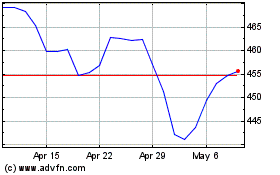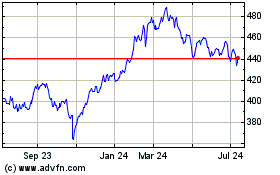Mastercard's Next CEO to Continue Company's Push Beyond Cards--2nd Update
February 25 2020 - 7:57PM
Dow Jones News
By AnnaMaria Andriotis
Mastercard Inc.'s pick for its next chief executive puts more
muscle behind the company's effort to expand beyond its legacy
cards business.
The company said Tuesday that Ajay Banga, its chief for nearly a
decade, will be replaced by Chief Product Officer Michael Miebach
effective Jan. 1. Mr. Banga will become executive chairman of the
board. Current Chairman Richard Haythornthwaite will retire.
For decades, Mastercard primarily provided the rails for debit-
and credit-card payments. But Mastercard and rivals like Visa Inc.
are facing competition from new payments companies and trying to
navigate changing consumer habits, while also developing technology
to play a bigger role in business-to-business payments. Mr. Banga,
the longest-tenured CEO of a major U.S. card network, has focused
on transforming Mastercard from largely cards-based payments to a
range of payment technologies.
New competitors that let consumers bypass cards have been a
driving factor. In Asia, for example, mobile wallets like WeChat
Pay and Alipay have grown rapidly, allowing consumers to shop with
money moving directly from their deposit account to the merchant.
More broadly, the payments sector is undergoing big changes as tech
giants including Apple Inc., Amazon.com Inc. and Alphabet Inc.s'
Google aim to grab a bigger piece of the market, raising the
prospect that cards could play a smaller role in payments in the
future.
"Everything's changing and what we've tried to do inside the
company, rather than be in a foxhole, I'd rather go out there and
embrace the change and try to drive it," Mr. Banga said in an
interview. Shares fell 6.7% Tuesday, an off day for the
markets.
The company has tried to break away from being branded a card
firm. Last year, it said it was removing its name from its logo in
most contexts, leaving just the familiar red and yellow circles to
represent the brand on cards, advertising and elsewhere.
"We aren't really just a card company," Mr. Banga said. "We are
a payments and technology organization that enables the movement of
money [between] account[s]. That's who we are and that's why I
don't like that we are called a card company."
Mastercard is the second-largest card network in the U.S. behind
Visa.
Before Mr. Banga took over in 2010, card-based transactions
accounted for about 80% of the company's revenue. That has since
declined to just over 50%, the company said.
Another revenue stream the company has grown involves selling
consumers' spending data to governments, banks, merchants and other
companies. Mastercard says the data is anonymized and that it
doesn't sell individual transaction data.
The focus on shifting the company beyond cards will continue
with Mr. Miebach, whose expertise includes digital and real-time
payments. Mr. Miebach has played a crucial role in the company's
empire building, leading the deals to acquire Vocalink, a
payment-technology firm that allows payments to move between bank
accounts, and Nets, a Danish payment-services provider. The Nets
deal, which is in the process of closing, would be its biggest.
Last year, Mastercard bought Vyze, a technology company that
enables point-of-sale lending, where loans are offered to consumers
at checkout. That type of lending has threatened to take away
purchase volume from cards.
Mr. Miebach also led a push to enable Mastercard payments in
emerging markets and was president of Mastercard's Middle East and
Africa operations between 2010 and 2015.
Mastercard stands to benefit from a trade deal the U.S. signed
with China last month, which could clear some of the obstacles that
prevented it and other U.S. financial-services companies from
having a bigger presence in China.
--Micah Maidenberg contributed to this article.
Write to AnnaMaria Andriotis at annamaria.andriotis@wsj.com
(END) Dow Jones Newswires
February 25, 2020 19:42 ET (00:42 GMT)
Copyright (c) 2020 Dow Jones & Company, Inc.
MasterCard (NYSE:MA)
Historical Stock Chart
From Mar 2024 to Apr 2024

MasterCard (NYSE:MA)
Historical Stock Chart
From Apr 2023 to Apr 2024
